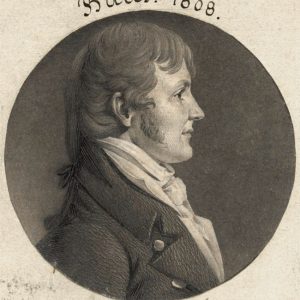calsfoundation@cals.org
James Woodson Bates (1788–1846)
James Woodson Bates was an early Arkansas settler who was elected as the first Arkansas territorial representative to the U.S. Congress. After leaving that office, he went on to help develop Arkansas’s legal system as a judge and lawyer. Batesville (Independence County) was named after him in 1824.
James Bates was born on August 25, 1788, in Belmont, Virginia, to Thomas F. Bates and Caroline Woodson Bates. Little is known of his early life, but he attended Yale College (now Yale University). He eventually graduated from Princeton College (now Princeton University) in 1807 and began practicing law in Virginia. In 1816, he moved to St. Louis, Missouri, where his brother Frederick Bates had been appointed territorial secretary. In 1819, he, like so many other young ambitious men, moved to Arkansas Post (Arkansas County) in the Arkansas Territory. He quickly fell under the patronage of acting governor and secretary of the territory Robert Crittenden. He and Crittenden became partners in a land agency and may have been law partners. In the summer of 1819, before James Miller, the first territorial governor, arrived, Crittenden appointed Bates to be circuit judge.
In the fall of 1819, Bates ran for territorial delegate to the U.S. Congress. Each territory was given one representative in Congress to defend and promote the territory’s interests. Bates ran against and defeated five other candidates, including Stephen F. Austin. During Bates’s first term in office, the most important issue before the Congress regarding Arkansas was the Choctaw Treaty, which General Andrew Jackson negotiated in October 1820. Under this treaty, the Choctaw gave up land in Mississippi in exchange for large tracts of land in Arkansas. According to Bates, no one in Congress had consulted the citizens of Arkansas, though the territory stood to lose two of its seven counties, with an estimated 5,000 settlers losing their property. When Congress met again in late 1820, Bates wrote a letter to the secretary of war, explaining his position that this treaty would destroy Arkansas’s prospects for growth and early admission to statehood. He thought that this information would be sent to the president, who would then refuse to send the treaty to Congress, but he was wrong. The Senate ratified the treaty in 1821.
In 1821, Bates ran for reelection. Two others ran against him, most notably Matthew Lyon, who had served in the Revolutionary War and had been jailed by the Federalist administration in 1798 under the Sedition Act. Bates narrowly won the election, and when Crittenden declared Bates the winner, Lyon filed a protest with the U.S. House of Representatives. Lyon believed that Crittenden had cheated but was refused when he asked to see the election records. Congress declared Bates the victor, saying that Lyon did not offer sufficient evidence to prove his case.
By 1822, Bates was coming under attack from anonymous writers in the Arkansas Gazette, who condemned him for not working harder to get the Choctaw Treaty dismissed. In November 1822, Bates returned to Arkansas and had a meeting with Henry W. Conway at which he allegedly told Conway that he did not want to run for reelection in 1823 and would gladly step aside if Conway wanted to run. Conway promised to let Bates know but decided to run for office without notifying him. Others stepped in to run, and Crittenden began to actively campaign for Conway. In February 1823, Bates returned to Arkansas to find that the election was already well under way. He published a public statement defending himself in Congress and announcing that he would be a candidate. When it became obvious that Bates could not win, he threw his support behind William Bradford and began to write letters attacking Conway, though Conway won the election. The election created a rift in the relationship between Crittenden and Bates that took many years to mend.
Bates ran again in 1825 and lost. He returned to his law practice in Batesville. Bates had moved to this region in the 1820s. In 1824, the citizens of the city named it Batesville in honor of Bates’s service to the state as the first congressional delegate. He was appointed judge of the Second Judicial Circuit in November 1825 and held that position until 1831. As time went on, Crittenden and Bates began to work together again. By 1833, Crittenden was under attack from Ambrose Sevier, who had replaced Conway as delegate after Crittenden killed Conway in a duel. When Crittenden ran against Sevier in 1833, Bates was one of his supporters, though Crittenden lost.
In 1835, he was elected as a delegate to the state constitutional convention, where he was selected as chairman of the committee on the legislative branch. By 1836, Bates had moved to Crawford County and was elected as county judge. In the 1840s, he was the registrar for the land office in Clarksville (Johnson County). He died on December 26, 1846, and is buried in a family plot in what is now Sebastian County.
For additional information:
Lankford, George. “From Poke to Bates.” Independence County Chronicle 61 (July 2020): 15–33.
Ross, Margaret. Arkansas Gazette: The Early Years, 1819–1866. Little Rock: Arkansas Gazette Foundation, 1969.
White, Lonnie J. “The Arkansas Territorial Election of 1823.” Arkansas Historical Quarterly 18 (Winter 1959): 325–337.
———. “Arkansas Territorial Politics, 1824–1827.” Arkansas Historical Quarterly 20 (Spring 1961): 17–38.
———. Politics on the Southwestern Frontier: Arkansas Territory, 1819–1836. Memphis: Memphis State University Press, 1964.
James D. Ross Jr.
University of Arkansas at Little Rock
 Louisiana Purchase through Early Statehood, 1803 through 1860
Louisiana Purchase through Early Statehood, 1803 through 1860 Politics and Government
Politics and Government James W. Bates
James W. Bates 




Comments
No comments on this entry yet.